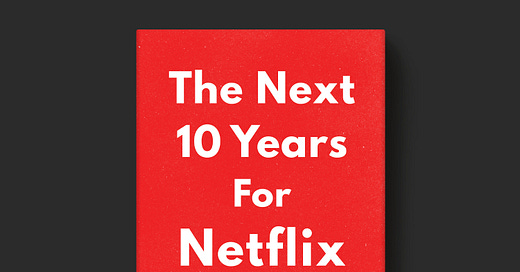The Next 10 Years For Netflix: How The Streaming Giant Can Create The Next Giant Film Category
Why gaming is not Netflix's next big category opportunity.
ARRRRRR! Pirates, you may have noticed our Substack now looks more like a digital library (“mini-book” covers galore!) and less like a “newsletter.” That’s because we firmly believe the legacy business book category is broken (stretching 1 idea across 300 pages), and we are committed to creating a new category of “mini-books” that present radically different thinking in a fraction of the time (~8,000 words vs 80,000 words). Reading has the power to unlock some of the most transformational outcomes any of us can experience in our lives, and our Chief Aim is to present you with powerful, new ideas each week—but not ask you to slog through 300 pages in the process. We hope these “mini-books” change the way the writers in the legacy business category measure success. Because word count is a poor measure of value.
In addition, starting in January, 2022, all of our “mini-books” will be published as eBooks on Amazon as well. Which means, if you are not a paying subscriber of Category Pirates but would like to read a specific “mini-book,” you can purchase it as a stand alone—or, if you are a Pirate but want to gift a specific “mini-book” to friends, coworkers, etc., you can gift them that “mini-book” digitally through Amazon.
And now, on with our standard programming… 🏴☠️🏴☠️🏴☠️
Dear Friend, Subscriber, and Category Pirate,
Every so often, we enjoy applying the Category Lens to a specific company.
For three reasons…
First, we believe you will find it interesting—because we, ourselves, find it interesting.
Second, the standard media has no Category Lens. Much of what you read in the news and Tier 1/Tier 2 business publications misses this huge point of context. These publications and writers talk about business like it’s the weather, and fail to recognize that categories don’t just “happen on their own.” Someone has to Frame the problem, Name the solution, and Claim the outcome & subsequent transformation. (Remember: the wheel existed for more than 100 years before someone realized, if you turned it on its side, it could be used for transportation and not just pottery. If products could speak for themselves, they would. But they can’t, and so someone has to educate the world on why they matter.)
Third, our chief aim is to show you how we look at companies, ideas, and innovative people in the world through a Category Lens so that you can do the same. We don’t just want to ask questions for the sake of asking questions, but so you can see how we examine the world around us and make sense of category headwinds & tailwinds. And then for you to internalize this way of thinking so you can look at your own life and business in a similar, rigorous way.
So, without further adieu...
This past summer, Netflix announced its plans to offer gaming products on its streaming platform.
The first games launched on Android in early November, 2021, and are included alongside the streaming service’s movies and TV offers, bundled within the same monthly price. To spearhead these efforts, Netflix hired a gaming executive, Mike Verdu, with experience at Zynga and Electronic Arts.
We recently wrote a column for Harvard Business Review titled, “Gaming Isn’t Netflix’s Best Opportunity For Growth,” explaining why this category adjacency strategy (growing into adjacent markets) isn’t Netflix’s golden opportunity. Growing into adjacent markets makes the most sense when it allows a company to cross-sell or create an entirely new kind of revenue-generating business. Neither is true in this case. Instead, Netflix is signaling it might be about to make the single greatest category design mistake in the book, hoping to win the category war by extending its brand into other categories (with existing category leaders) where it does not have a leadership position. Al Ries & Jack Trout first wrote about this in their book, “The 22 Immutable Laws of Marketing,” back in 1994 (be sure to study your marketing history, pirates. ARRRRRRR!).
“By far the most violated law in our book is the law of line extension. What’s even more diabolical is that line extension is a process that takes place continuously, with almost no conscious effort on the part of the corporation. It’s like a closet or a desk drawer that fills up with almost no effort on your part. One day, a company is tightly focused on a single product that is highly profitable. The next day, the same company is spread thin over many products and is losing money.” –The 22 Immutable Laws of Marketing
The logic behind line extension is that because the brand has become so big and so successful (The Big Brand Lie), the company has now achieved Julius Caesar status: they can stroll up into any territory they want and take it with ease. But as we have written about extensively, this just ain’t so.
What happened when Google tried to stroll into Facebook’s social networking category with Google+? They failed.
What happened when Microsoft tried to stroll into Apple’s in-store category with their own Microsoft stores? They lost $450 million.
What happened when Red Bull, the Category Queen of the energy drink category, tried to beat Coca-Cola at its own game by launching Red Bull Cola? They shut the product line down three years later.
Keep reading with a 7-day free trial
Subscribe to Category Pirates to keep reading this post and get 7 days of free access to the full post archives.





